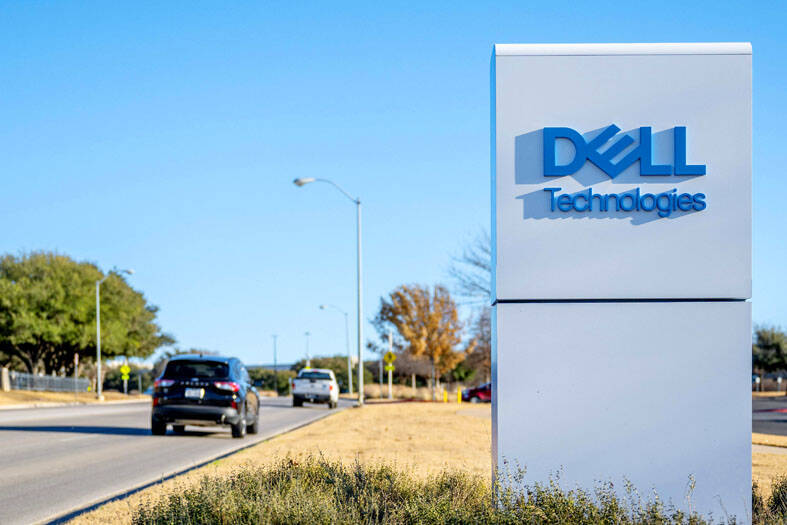Dell Technologies Inc is planning to stop using Chinese-made chips by next year and has told suppliers to reduce the amount of other made-in-China components in its products amid concerns over US-China tensions, the Nikkei reported yesterday.
The computer maker late last year told suppliers that it aims to meaningfully lower the amount of Chinese-made chips it uses, including those produced at facilities owned by non-Chinese chipmakers, the report added, citing three people with direct knowledge of the matter.
Dell has also asked suppliers of other components, such as electronic modules and print circuit boards, and product assemblers to help prepare capacity in countries beyond China, such as Vietnam, the report said.

Photo: AP
The report came after the US last month added Chinese memorychip maker Yangtze Memory Technology Corp (長江存儲) and 21 “major” Chinese players in the artificial intelligence chip sector to a trade blacklist.
In October last year, US President Joe Biden’s administration published a set of export controls that included a measure to cut China off from certain semiconductor chips made anywhere in the world with US tools.
PC maker HP Inc, one of Dell’s rivals, has also begun surveying its suppliers to gauge the feasibility of moving production and assembly away from China, the Nikkei reported.
Dell and HP did not immediately respond to a Reuters request for comment.
Separately, China’s Luxshare Precision Industry Co (立訊精密) yesterday said its cooperation with current clients was normal, in response to a media report that iPhone maker Apple Inc had asked suppliers to cut production.
The electronics manufacturer said it wanted to clarify a recent report from a Taiwanese media company that said Luxshare had suffered the biggest impact from the Apple request.
“There are no special changes or impact to the relevant business of the company mentioned in the report,” Luxshare said in a statement.
“Currently the company’s cooperation with existing customers is progressing normally and the business is moving forward in an orderly manner according to the work plan,” the company said.
Luxshare makes connector cables for iPhones and Macbooks, manufactures AirPods, and owns factories capable of making iPhones.
Apple had told suppliers to manufacture fewer components for its ear buds, watches and laptops as a sluggish global economy and high inflation might hurt demand for Apple devices, a report by the Nikkei said on Monday, citing unnamed suppliers.

Taiwan’s technology protection rules prohibits Taiwan Semiconductor Manufacturing Co (TSMC, 台積電) from producing 2-nanometer chips abroad, so the company must keep its most cutting-edge technology at home, Minister of Economic Affairs J.W. Kuo (郭智輝) said yesterday. Kuo made the remarks in response to concerns that TSMC might be forced to produce advanced 2-nanometer chips at its fabs in Arizona ahead of schedule after former US president Donald Trump was re-elected as the next US president on Tuesday. “Since Taiwan has related regulations to protect its own technologies, TSMC cannot produce 2-nanometer chips overseas currently,” Kuo said at a meeting of the legislature’s

Semiconductor shares in China surged yesterday after Reuters reported the US had ordered chipmaking giant Taiwan Semiconductor Manufacturing Co (TSMC, 台積電) to halt shipments of advanced chips to Chinese customers, which investors believe could accelerate Beijing’s self-reliance efforts. TSMC yesterday started to suspend shipments of certain sophisticated chips to some Chinese clients after receiving a letter from the US Department of Commerce imposing export restrictions on those products, Reuters reported on Sunday, citing an unnamed source. The US imposed export restrictions on TSMC’s 7-nanometer or more advanced designs, Reuters reported. Investors figured that would encourage authorities to support China’s industry and bought shares

TECH WAR CONTINUES: The suspension of TSMC AI chips and GPUs would be a heavy blow to China’s chip designers and would affect its competitive edge Taiwan Semiconductor Manufacturing Co (TSMC, 台積電), the world’s biggest contract chipmaker, is reportedly to halt supply of artificial intelligence (AI) chips and graphics processing units (GPUs) made on 7-nanometer or more advanced process technologies from next week in order to comply with US Department of Commerce rules. TSMC has sent e-mails to its Chinese AI customers, informing them about the suspension starting on Monday, Chinese online news outlet Ijiwei.com (愛集微) reported yesterday. The US Department of Commerce has not formally unveiled further semiconductor measures against China yet. “TSMC does not comment on market rumors. TSMC is a law-abiding company and we are

FLEXIBLE: Taiwan can develop its own ground station equipment, and has highly competitive manufacturers and suppliers with diversified production, the MOEA said The Ministry of Economic Affairs (MOEA) yesterday disputed reports that suppliers to US-based Space Exploration Technologies Corp (SpaceX) had been asked to move production out of Taiwan. Reuters had reported on Tuesday last week that Elon Musk-owned SpaceX had asked their manufacturers to produce outside of Taiwan given geopolitical risks and that at least one Taiwanese supplier had been pushed to relocate production to Vietnam. SpaceX’s requests place a renewed focus on the contentious relationship Musk has had with Taiwan, especially after he said last year that Taiwan is an “integral part” of China, sparking sharp criticism from Taiwanese authorities. The ministry said